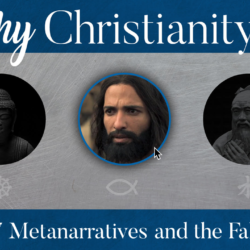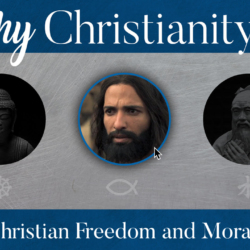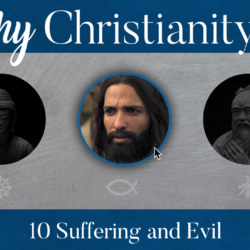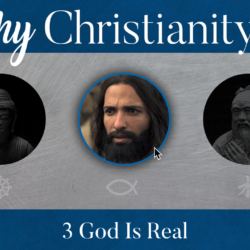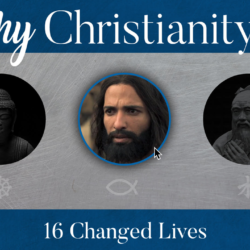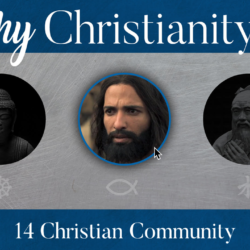Apologetics 1: Introduction
Have you ever heard of apologetics? This is the field where Christians seek to provide the reasons for why they believe what they believe. In a post-Christian society, it is increasingly important to understand the reasons for your faith. For example, why do you believe in God’s existence? Why do you think the bible is true? How do you know God raised Jesus from the dead? What about pain and suffering, modern science, or Christianity’s sexual ethics? In the next fifteen lectures, you’ll get answers to these important questions so you can build your own faith as well as get better at sharing it with others.
If you would like to take this class for credit, please contact the Atlanta Bible College so you can register and do the necessary work for a grade. Here now is lecture one: Introduction.
Notes:
The Biblical Mandate for Apologetics
- 1 Peter 3.14-16
- apologetics has nothing to do with apologizing, it is simply giving a reasoned defense of the faith
- two key guidelines: (1) gentleness, (2) respect
- ἀπολογία: a speech of defense, the act of making a defense
- as a speech: Acts 22.1
- as written: 1 Corinthians 9.3
- in court: 2 Timothy 4.16; Acts 25.16
- defending the gospel: Philippians 1.7
“The task of apologetics is to show that the evidence that the New Testament calls people to commit their lives to is compelling evidence and worthy of our full commitment. That often involves a lot of work for the apologist. Sometimes we would rather duck the responsibility of doing our homework, of wrestling with the problems and answering the objections, and simply say to people, ‘Oh, you just have to take it all in faith.’ That’s the ultimate cop-out. That doesn’t honor Christ. We honor Christ by setting forth for people the cogency of the truth claims of Scripture, even as God himself does.[1]”
Objections:
- Faith by definition excludes the possibility of certainty
“Sadly, in our day many Christians argue that we ought not to be engaged in attempts to ‘prove’ the truth claims of Christianity, that faith and proof are incompatible. ”[2]
- blind faith vs. informed faith
- what did Jesus do? did he ask people to just believe that he was the Messiah without offering any reasons for that belief? John 5.36; John 10.24-25, 37-38; 14.10-11
- Later on Jesus’ resurrection became the single most important proof of his claim to be Messiah. Acts 17.30-31; Romans 1.1-4 In the book of Acts, Jesus’ resurrection was mainly argued for on the basis of eye-witness testimony. Acts 1.22; 2.32; 3.15; 10.39-42; 13.31
- this is not to say we can have complete certainty, faith is still required, but it’s not a leap of blind faith
“The Bible never tells us to take a leap of faith into darkness and hope that there’s somebody out there. The Bible calls us to jump out of the darkness and into the light. That is not a blind leap.[3]”
- only the holy spirit can illuminate someone’s heart to believe
- much of apologetics is clearing out of the way barriers to belief
- Bible is full of contradictions
- Christians are all hypocrites
- How can there be a God if there is so much pain and suffering?
- Doesn’t God command genocide?
- Hasn’t science disproved miracles?
- What about evolution?
- What about the Big Bang?
- think of it like picking up rocks from the field before planting the seeds
- besides, God has chosen to work with the spoken word. foolishness of preaching (1 Cor 1.21)
- but doesn’t knowledge puff up? (1 Corinthians 8.1)
- this takes the verse out of context, see ESV of 1 Cor 8.1 “Now concerning food offered to idols: we know that “all of us possess knowledge.” This “knowledge” puffs up, but love builds up.” Paul is confronting their slogan “all of us possess knowledge” in a specific context, i.e. with regard to food offered to idols. The issue was how they were using their knowledge. They were using it in a way that disregarded their weaker brothers.
Reasons to Study Apologetics
- we are commanded to do it in 1 Peter 3.15
- it builds your own faith even when you have emotional doubt
- it helps you build other Christians in their faith when they face tough questions
- it is necessary for evangelism, especially in our day and time
——————
[1] R. C. Sproul, Defending your Faith, Crossway, p. 25.
[2] ibid., p. 17.
[3] ibid., p. 25.

